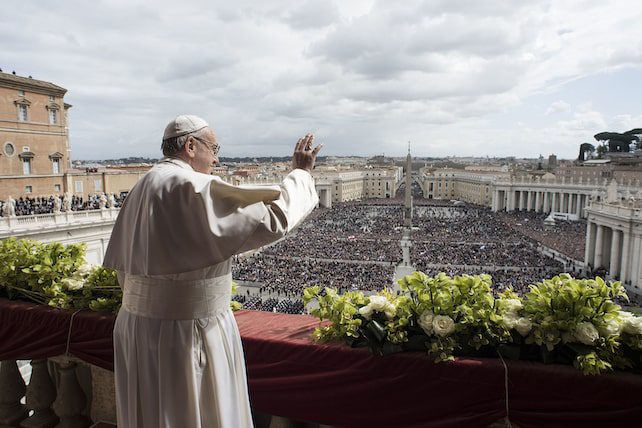VATICAN CITY (RNS) — Pope Francis, who sought to be a bridge maker as he led the Catholic Church in a time of deep polarization, died at 7:35 a.m. on Monday (April 21), at the age of 88, a day after surprising faithful in St. Peter’s Square on Easter Sunday.
“He taught us to live the values of the Gospel with fidelity, courage and universal love, especially toward the poorest and most marginalized,” read a Vatican statement by Cardinal Kevin Farrell, who is charged with overseeing the papal funeral and the election of the next pope.
The pope had been recovering from double pneumonia, for which he was hospitalized in mid-February and released after five weeks. The aging pontiff was initially treated for bronchitis during his hospital stay, but his doctors later said that he had developed pneumonia and was in critical condition at the time. Part of Francis’ lung had been removed at 21 after a life-threatening pneumonia.
As he aged, he had suffered a number of ailments, from sciatica to cataracts to chronic knee pain, and visitors to the Vatican were accustomed to seeing the pope struggle to walk when not seated in a wheelchair.
With his pastoral style of leadership and his emphasis on mercy, however, Francis restored the credibility of the church in the eyes of Catholics and non-Catholics after decades of bad news about clergy sex abuse, financial scandals and decline in attendance at Catholic churches.
“The pontificate of Pope Francis has been a breath of fresh air for the Catholic Church globally. He was loved for his simplicity, humility, and warmth,” said Sandie Cornish, senior lecturer in theology at the Australian Catholic University and a member of the Vatican Dicaster for Integral Human Development.
“The first Jesuit Pope, the first Latin American Pope, the first Pope from outside Europe since the early church, Francis brought a fresh perspective ‘from below’ or ‘from the ends of the earth’ as he put it when he was elected,” Cornish added.
Francis was known for his commitment to welcoming migrants and refugees, the protection of the environment and support for the poor and marginalized, but he remained a polarizing figure for Catholics who mirror society’s political and ideological divisions. He was elected by his fellow cardinals in 2013 as a reformer who would restore credibility to the church’s troubled finances, restructure the Vatican’s Curial departments and the spiritual reform of the church’s leadership and faithful.
Pope Francis succeeded Pope Benedict XVI as leader of the Catholic Church in 2013, after his predecessor shocked the Catholic world by stepping down as pontiff and took the title of emeritus pope. While Benedict remained silent, he was still regarded as a champion of conservative views in contrast to Francis’ softer approach to Catholic doctrine. His presence weighed on Francis’ tenure, despite joint efforts to present a united papacy, until Benedict’s death in 2022.
Born Jorge Mario Bergoglio to a family of Italian immigrants in Bueno Aires, Argentina, on Dec. 17, 1936, Francis spent his youth as a chemical technician and took occasional jobs as a bouncer and janitor. At 22 he began to follow a vocation to become a priest, and after two years as a novitiate he entered the Society of Jesus, the order known as the Jesuits, on March 12, 1960.

